NWU Open Access Celebrations: 21 & 23 October 2025
#OAWeek
Theme: Who Owns Our Knowledge?
The Faculty of Natural and Agricultural Sciences, in collaboration with the Library and Information Service, proudly hosts NWU's 2025 Open Access Week celebrations. This annual global campaign raises awareness about the benefits of Open Access (OA) and invites critical engagement with emerging issues in scholarly publishing.
Open Access Week 2025 invites us to critically explore the question: Who really owns our knowledge? This theme challenges traditional models of knowledge ownership, prompting reflection on who controls access to research and scholarly outputs, whose voices are amplified or marginalised, and how knowledge can be equitably shared for the common good. As an academic library committed to fostering inclusive scholarship and open dissemination, we recognise that knowledge is a vital public resource that should transcend paywalls and restrictions. This week-long campaign will highlight how Open Access empowers researchers, students, and communities by removing barriers and promoting transparency, collaboration, and innovation.
This information session aims to spark conversation around the ethics of knowledge ownership, the role of intellectual property, and the importance of open infrastructure in academia. Our goal is to raise awareness and equip our university community with the tools to become active participants and advocates in the movement toward open, equitable knowledge sharing.
Join us in questioning existing power structures, celebrating diverse knowledge systems, and embracing Open Access as a path to a more just and informed society.
Programme and Registration Links
- All sessions are conducted online via MS Teams (a link to MS Teams will be provided upon registration).
Tuesday, 21 October 2025: 10:00 - 12:00
Who owns the knowledge?
The session will open with a keynote by Prof. Martial Zebaze Kana (UNESCO), setting the stage for a critical conversation on ownership, equity, and access in scholarly publishing.
This will be followed by a dynamic discussion featuring perspectives from across the publishing landscape, including a publisher representative, a journal editor, and an author.
Together, the speakers will explore the ethics of knowledge ownership, the challenges of paywalls and restrictions, and the possibilities of open access as a pathway to more inclusive, transparent, and equitable scholarship.
| Moderator: Ms Veliswa Tshetsha, NWU | |
| 10:00- 10:10 | Welcome and opening remarks: Prof Thebe, NWU Overview of International Open Access Week and its significance. |
| 10:10 - 10:30 | Prof Martial Zebaze Kana, UNESCO Keynote Address: "Who owns the knowledge?" |
| 10:30 - 10:50 | Ms Daneshree Moodley, Elsevier Publisher perspective: Who owns the knowledge?" |
| 10:50 - 11:10 | Prof Damian Onwudiwe, NWU Journal editor's perspective: "Who owns the knowledge?" |
| 11:10 - 11:30 | Prof Roelof Burger, NWU Authors' perspective: "Who owns the knowledge?" |
| 11:30 - 11:50 | Q & A Session |
| 11:50 - 12:00 | Closing remarks and vote of thanks: Mr Martin Nokoane, NWU |
Thursday, 23 October 2025: 10:40 - 12:10
Journey into Open Access publishing: Transformative Agreements as a vehicle
In celebration of International Open Access Week 2025, join the NWU Library and Information Service, in collaboration with the Faculty of Natural and Agricultural Sciences, for a powerful session that dives into the central theme: “Who owns the knowledge?”
This session offers a practical examination of how Transformative Agreements (TAs) are shaping the future of scholarly publishing. Featuring insights from a SANLiC and publisher representatives, and authors highlighting both the opportunities and challenges of TAs. This session will also spotlight one of the university’s top five authors publishing under TAs, offering a firsthand perspective on the impact of these agreements on research visibility and accessibility.
The session aims to equip researchers with knowledge on how TAs can be leveraged as a pathway to more open, equitable scholarly communication.
| Moderator: Mr Songezo Mpikashe, NWU | |
| 10:40 - 10:50 | Welcome and opening remarks: Ms Veliswa Tshetsha, NWU Who Owns Our Knowledge? A Journey into Transformative Agreements and Shared Ownership |
| 10:50 - 11:10 | Ms Zine Sapula, SANLiC Open Access publishing: Transformative Agreements as a vehicle |
| 11:10 - 11:30 | Prof Du Toit Loots, NWU Benefits and challenges of publishing in Transformative Agreements |
| 11:30 - 11:50 | Ms Johanna Kuhn, Springer Nature Transformative Agreements in action: Licensing insights, implementation strategies, and the path toward advancing Open Access |
| 11:50 - 12:00 | Q & A Session |
| 12:00 - 12:10 | Closing remarks and vote of thanks: Prof Francois van der Westhuizen, NWU |
Speakers: Tuesday, 21 October 2025
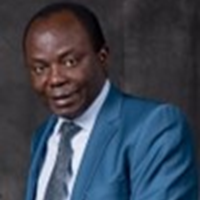
Prof Martial Zebaze Kana, UNESCO
Topic: Keynote Address: "Who owns the knowledge?"
Biography: Prof. Martial Zebaze Kana is currently the Head of Science at the UNESCO Regional Office for Southern Africa. He was previously the Chief of Section, Innovation and Capacity Building in Science and Engineering at UNESCO Headquarters in Paris, where he also served as executive secretary of the International Basic Science Programme. Prior to joining UNESCO in 2017, he was the Deputy Provost, College of Engineering and Technology, Kwara State University, Nigeria. He was also the UNESCO Chairholder in alternative energy at the same institution. Martial Zebaze Kana has been a visiting professor at many universities and research laboratories. His research focused on experimental studies of inorganic, organic and hybrid devices with special interest in devices on flexible or stretchable substrates in the field of renewable energy. He holds a PhD degree in experimental Solid State Physics.
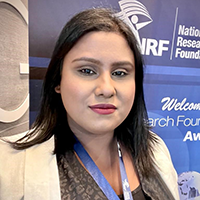
Ms Daneshree Moodley, Elsevier
Topic: Publisher perspective: Who owns the knowledge?"
Biography: With over 12 years of experience traversing the domains of legal, scientific, and medical publishing, Daneshree Moodley has honed her expertise within the intricate landscapes of academia. Professionally trained in Publishing and commerce, Daneshree is the Customer Success Manager for Elsevier, Sub-Saharan Africa. Her passion lies in cultivating meaningful connections and enriching academic experiences. In her role, she plays a pivotal part in shaping the scholarly landscape, championing the dissemination of knowledge and facilitating transformative academic endeavours across the African Continent.
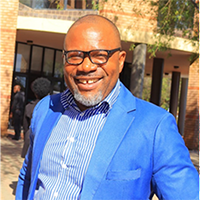
Prof Damian Onwudiwe, NWU
Topic: Journal editor's perspective: "Who owns the knowledge?"
Biography: Professor Damian C. Onwudiwe obtained his PhD in Inorganic and Materials Chemistry in 2011 from the University of Fort-Hare, South Africa. He leads the Inorganic and Materials Chemistry Research Group and the Nano-Environment Incubation Program (NanoEnv) at the North-West University, South Africa. He is an Extra-ordinary Professor at the Institute for Nanotechnology and Water Sustainability, iNanoWS, University of South Africa, and an Adjunct Faculty member in the Department of Applied Chemistry and Chemical Engineering at the University of Chittagong, Bangladesh. His research focuses on the design, synthesis, and application of functional nanomaterials for the remediation of water contaminated with hazardous inorganic and organic pollutants. He has made significant contributions to multidisciplinary projects addressing surface and groundwater treatment, with a particular emphasis on contaminants of emerging concern (CECs). By integrating materials chemistry with environmental sustainability, his work advances innovative approaches to water purification and resource protection. He has published several book chapters and research papers on diverse aspects of Inorganic and Materials Chemistry. He is a recipient of different international research travel awards, including a TWAS-DFG Fellowship as a Visiting Scientist at the University of Cologne, Germany; the UK Royal Society of Chemistry (RSC) Research Fellowship to King's College London, UK; and the Institutional Capacity Development Grant (UCDG) to the National Centre of Research in Materials Science, Tunisia. Prof. Onwudiwe is a college member of the International Development Peer Review of the United Kingdom Research Initiative (UKRI) and He is a National Research Foundation (NRF) of South Africa-rated researcher in the C2 category. Additionally, Prof. Onwudiwe serves as an Associate Editor of Scientific Reports, Frontiers in Nanotechnology, and an Editorial Board member of Frontiers in Materials, Results in Surface and Interface Science, and Catalysts.
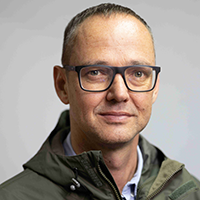
Prof Roelof Burger, NWU
Topic: Authors' perspective: "Who owns the knowledge?"
Biography: Roelof Burger is a Professor of Atmospheric Science at North-West University, specialising in air quality, radar meteorology, and climate systems. He has over 20 years of experience leading national and international projects on emissions, weather radar, and climate risk, working with partners such as the World Meteorological Organisation, World Bank, and the South African Weather Service. He has published more than 75 peer-reviewed papers. As a member of the national council, and later President of the National Association for Clean Air, the custodian of the Clean Air Journal, one of South Africa's only fully open-access journals in atmospheric science, he advocates for equitable access to environmental data and scientific knowledge. His work focuses on strengthening open, collaborative science to support evidence-based policy and public good decision-making.
Speakers: Thursday, 23 October 2025
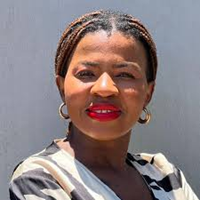
Ms Zine Sapula, SANLiC
Topic: Open Access publishing: Transformative Agreements as a vehicle
Biography: Ms Zine Sapula is an Open Access Project Manager at SANLiC. She holds a BA degree in information science from Unisa and is a certified data carpentry instructor. She has over 10 years of experience in LIS, having worked in various South African institutions, including national, public, special and academic libraries. Her professional expertise encompasses open science, information literacy, collection development, data analysis, and referencing. Currently serving in OA2020 Working Groups: Collaborating to shape the next phase of OA transition.
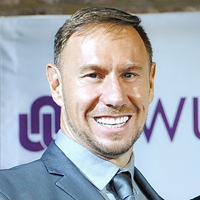
Prof Du Toit Loots, NWU
Topic: Benefits and challenges of publishing in Transformative Agreements
Biography: Prof Loots pioneered groundbreaking metabolomics research, developing new methodologies towards improved disease characterization, with a particular focus on tuberculosis (TB), HIV and diabetes. Using these new metabolomics strategies, he characterized 5 new drugs for use towards improved TB treatment and registered 2 global TB diagnostic patents (PCT/IB2012051995 and NL2019074B1 - see Google Patents for a full description) and published a synthesis method for NaFe(III)EDTA (a stable isotope form of a highly bioavailable iron salt used in iron bioavailability studies and for treating iron deficiency anaemia globally). He has supervised 84 PhD, MSc, and BSc Honors students, as well as 10 international post-doctoral fellows. He is an editor for the journal Cell Tissue Research and serves on the Board of Directors of Metabolomics South Africa (MSA) and is the MSA representative for SA's metabolomics interests internationally at the International Metabolomics Society AGMs. Significant external recognition during his academic career includes receiving the: 1) 2005 International Nestle Nutrition Institute Research Award (Switzerland), 2) 2007 International Research ARP Walker Award (SA), 3) 2006 Janssen-Cilag Best Publication Award (UK), 4) 2009 Most Productive Researcher Award (NWU, SA), 5) 2010 International Scripps Centre for Integrative Medicine Research Award (CA), 6) recognition in the journal Spectroscopy Now (John Wiley and Sons Inc., USA) for his patent-PCT/IB2012051995, in an article titled "Testing times for TB: statistics distinguish" (2012), 7) 2016 Most Innovative Research Entity Director Award for the highest number of IP disclosures (NWU, SA), 8) 2018 Science Oscar Award Finalist (SA), 9) 2020 John Wiley and Sons Inc. Most Downloaded Paper Award (USA), and 10) currently holds a B2 Rating with the NRF.
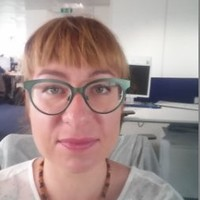
Ms Johanna Kuhn, Springer Nature
Topic: Transformative Agreements in action: Licensing insights, implementation strategies, and the path toward advancing Open Access
Biography: Having joined BioMed Central (part of Springer Nature) in 2008, Johanna's core role is to support the local Springer Nature Licensing Teams in Eastern Europe, the Middle East, parts of Asia and Africa with her open access expertise, as the importance of Transformative Agreements is increasing. In addition, she is responsible for creating and maintaining institutional partnerships and increasing awareness of open research at Springer Nature.
NWU Library Initiatives
- Hosts and maintains the NWU Institutional Repository, which collects, preserves, and distributes NWU research material at no cost to the user.
- Boloka (NWU-IR) serves as the primary repository for all NWU Electronic Theses and Dissertations (ETDs).
- Dedicated librarians assist researchers with uploading their outputs to Boloka.
- Hosts and maintains Open Journal Systems (OJS), an open-source solution for managing and publishing scholarly journals online.
- The library provides a search platform for open-access accredited journals.
- Open Access - Transformative Agreements

